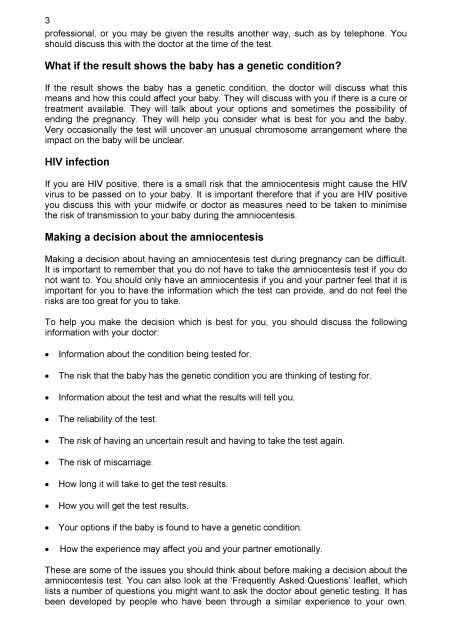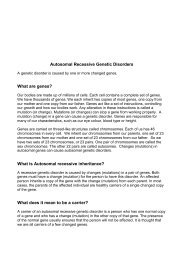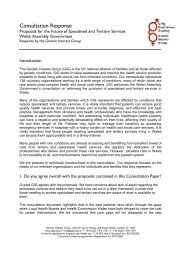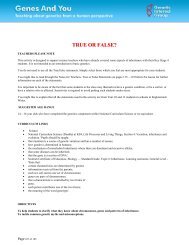The Amniocentesis Test - Genetic Alliance UK
The Amniocentesis Test - Genetic Alliance UK
The Amniocentesis Test - Genetic Alliance UK
You also want an ePaper? Increase the reach of your titles
YUMPU automatically turns print PDFs into web optimized ePapers that Google loves.
3<br />
professional, or you may be given the results another way, such as by telephone. You<br />
should discuss this with the doctor at the time of the test.<br />
What if the result shows the baby has a genetic condition?<br />
If the result shows the baby has a genetic condition, the doctor will discuss what this<br />
means and how this could affect your baby. <strong>The</strong>y will discuss with you if there is a cure or<br />
treatment available. <strong>The</strong>y will talk about your options and sometimes the possibility of<br />
ending the pregnancy. <strong>The</strong>y will help you consider what is best for you and the baby.<br />
Very occasionally the test will uncover an unusual chromosome arrangement where the<br />
impact on the baby will be unclear.<br />
HIV infection<br />
If you are HIV positive, there is a small risk that the amniocentesis might cause the HIV<br />
virus to be passed on to your baby. It is important therefore that if you are HIV positive<br />
you discuss this with your midwife or doctor as measures need to be taken to minimise<br />
the risk of transmission to your baby during the amniocentesis.<br />
Making a decision about the amniocentesis<br />
Making a decision about having an amniocentesis test during pregnancy can be difficult.<br />
It is important to remember that you do not have to take the amniocentesis test if you do<br />
not want to. You should only have an amniocentesis if you and your partner feel that it is<br />
important for you to have the information which the test can provide, and do not feel the<br />
risks are too great for you to take.<br />
To help you make the decision which is best for you, you should discuss the following<br />
information with your doctor:<br />
• Information about the condition being tested for.<br />
• <strong>The</strong> risk that the baby has the genetic condition you are thinking of testing for.<br />
• Information about the test and what the results will tell you.<br />
• <strong>The</strong> reliability of the test.<br />
• <strong>The</strong> risk of having an uncertain result and having to take the test again.<br />
• <strong>The</strong> risk of miscarriage.<br />
• How long it will take to get the test results.<br />
• How you will get the test results.<br />
• Your options if the baby is found to have a genetic condition.<br />
• How the experience may affect you and your partner emotionally.<br />
<strong>The</strong>se are some of the issues you should think about before making a decision about the<br />
amniocentesis test. You can also look at the ‘Frequently Asked Questions’ leaflet, which<br />
lists a number of questions you might want to ask the doctor about genetic testing. It has<br />
been developed by people who have been through a similar experience to your own.
















